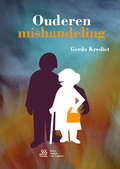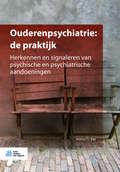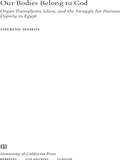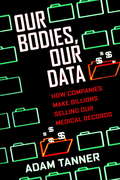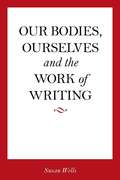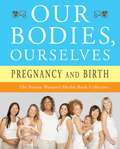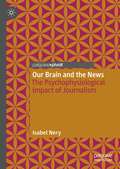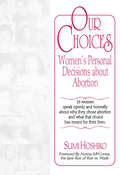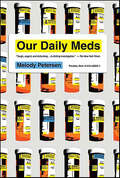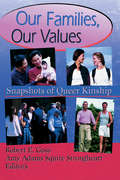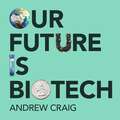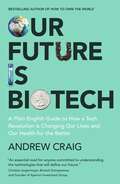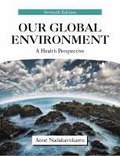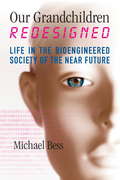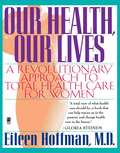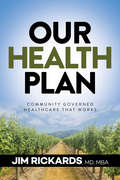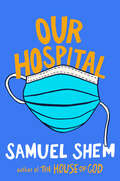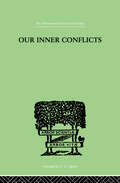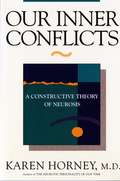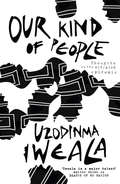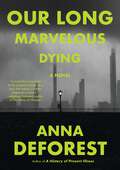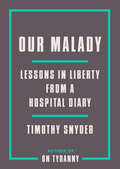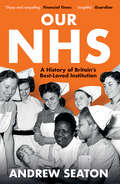- Table View
- List View
Ouderenmishandeling
by Gerda KredietHet boek ‘Ouderenmishandeling’ is bedoeld voor professionals in de zorg die in hun werk te maken krijgen met ouderen die mishandeld worden. Ouderenmishandeling is vaak een gevolg van overbelaste mantelzorg, echtelijke ruzies en opzettelijke mishandeling. De mishandeling kan bestaan uit lichamelijke mishandeling, psychische mishandeling, verwaarlozing, financiële uitbuiting en seksuele mishandeling. Het boek bestaat uit twee delen. In het eerste deel zijn vijftien casussen beschreven, waarna een analyse volgt van de gepleegde interventies en de resultaten. De casuïstiek is toegankelijk beschreven en maakt goed duidelijk wat ouderenmishandeling precies is, ook voor de nonprofessional. In het tweede deel worden interventiemogelijkheden beschreven die professionele hulpverleners concreet kunnen helpen bij de aanpak van ouderenmishandeling. Daarnaast vindt de lezer belangrijke informatie over wet- en regelgeving. ‘Ouderenmishandeling’ is een onmisbaar boek voor iedereen die zich beroepsmatig bezighoudt met ouderen: aandachtfunctionarissen, medewerkers Steunpunten Huiselijk Geweld, artsen, psychiaters, verpleegkundigen, thuiszorgmedewerkers, ouderenadviseurs en maatschappelijk werkers. Gerda Krediet werkte tien jaar als sociaalpsychiatrisch verpleegkundige bij het Meldpunt Ouderenmishandeling van de GGD Rotterdam-Rijnmond. Zij is nu directeur van Nood Zaak, een bureau voor advies, onderzoek en interventie bij ouderenmishandeling, en professioneel mentorschap.
Ouderenpsychiatrie: Herkennen en signaleren van psychische en psychiatrische aandoeningen
by Martin G. KatDit boek leert zorgprofessionals die werken met ouderen, om psychiatrische en psychische aandoeningen bij hun cliënten te herkennen en signaleren. Zij kunnen dankzij dit boek vroege adequate behandeling mogelijk maken.Dit boek koppelt praktijkvoorbeelden aan de beschreven aandoeningen bij ouderen. Professionals die werken met ouderen, zoals verzorgenden, (wijk)verpleegkundigen, POH’s en casemanagers.
Our Bodies Belong to God
by Sherine HamdyWhy has Egypt, a pioneer of organ transplantation, been reluctant to pass a national organ transplant law for more than three decades? This book analyzes the national debate over organ transplantation in Egypt as it has unfolded during a time of major social and political transformation--including mounting dissent against a brutal regime, the privatization of health care, advances in science, the growing gap between rich and poor, and the Islamic revival. Sherine Hamdy recasts bioethics as a necessarily political project as she traces the moral positions of patients in need of new tissues and organs, doctors uncertain about whether transplantation is a "good" medical or religious practice, and Islamic scholars. Her richly narrated study delves into topics including current definitions of brain death, the authority of Islamic fatwas, reports about the mismanagement of toxic waste predisposing the poor to organ failure, the Egyptian black market in organs, and more. Incorporating insights from a range of disciplines, Our Bodies Belong to God sheds new light on contemporary Islamic thought, while challenging the presumed divide between religion and science, and between ethics and politics.
Our Bodies, Our Data: How Companies Make Billions Selling Our Medical Records
by Adam TannerHow the hidden trade in our sensitive medical information became a multibillion-dollar business, but has done little to improve our health-care outcomesHidden to consumers, patient medical data has become a multibillion-dollar worldwide trade industry between our health-care providers, drug companies, and a complex web of middlemen. This great medical-data bazaar sells copies of the prescription you recently filled, your hospital records, insurance claims, blood-test results, and more, stripped of your name but possibly with identifiers such as year of birth, gender, and doctor. As computing grows ever more sophisticated, patient dossiers become increasingly vulnerable to reidentification and the possibility of being targeted by identity thieves or hackers.Paradoxically, comprehensive electronic files for patient treatment—the reason medical data exists in the first place—remain an elusive goal. Even today, patients or their doctors rarely have easy access to comprehensive records that could improve care. In the evolution of medical data, the instinct for profit has outstripped patient needs. This book tells the human, behind-the-scenes story of how such a system evolved internationally.It begins with New York advertising man Ludwig Wolfgang Frohlich, who founded IMS Health, the world’s dominant health-data miner, in the 1950s. IMS Health now gathers patient medical data from more than 45 billion transactions annually from 780,000 data feeds in more than 100 countries. Our Bodies, Our Data uncovers some of Frohlich’s hidden past and follows the story of what happened in the following decades. This is both a story about medicine and medical practice, and about big business and maximizing profits, and the places these meet, places most patients would like to believe are off-limits.Our Bodies, Our Data seeks to spark debate on how we can best balance the promise big data offers to advance medicine and improve lives while preserving the rights and interests of every patient. We, the public, deserve a say in this discussion. After all, it’s our data.
Our Bodies, Ourselves and the Work of Writing
by Susan WellsWells (English, Temple U. ) has written an engaging study of the women and process behind the groundbreaking work, Our bodies ourselves, both its first 1973 edition and the 1984 revision. Produced by the Boston Women's Health Book Collective, Our bodies, ourselves was a revolutionary work, one which was written collectively. Wells presents a detailed chronological account of the conferences and meetings that led to the assignment of topics, the tussles with the publisher to maintain their voice, and later, their focus on the issue of the medicalization of women, in part as this was formulated by Brandeis sociologist Kenneth Zola. This is a superb, in-depth case study of an important organization of American feminism and its influential voice. Annotation ©2010 Book News, Inc. , Portland, OR (booknews. com)
Our Bodies, Ourselves: Pregnancy and Birth
by Judy Norsigian Boston Women's Health Book CollectiveALL THE INFORMATION YOU NEED TO MAKE WISE DECISIONS ABOUT YOUR PREGNANCY AND THE BIRTH OF YOUR CHILD -- FROM THE EDITORS OF THE CLASSIC "BIBLE OF WOMEN'S HEALTH" Pregnancy and birth are as ordinary and extraordinary as breathing, thinking, or loving. But as soon as you announce you're expecting, you may be bombarded with advice from every angle -- well-meaning friends, relatives, medical professionals, even strangers want to weigh in on what you should or shouldn't do, and it's easy to feel overwhelmed by their conflicting recommendations. Our Bodies, Ourselves: Pregnancy and Birth will help you sort fact from fiction, giving you the most accurate research, up-to-date information, and the firsthand experiences of numerous women who have been exactly where you are today. You'll get the tools you need to take care of yourself and your baby during and after your pregnancy, from tips on eating well during pregnancy to strategies for coping with stress and depression. Learn everything you need to know about: CHOOSING A GOOD HEALTH CARE PROVIDER SELECTING A PLACE OF BIRTH UNDERSTANDING PRENATAL TESTING COPING WITH LABOR PAIN SPEEDING YOUR PHYSICAL RECOVERY ADJUSTING TO LIFE AS A NEW MOTHER OUR BODIES, OURSELVES: PREGNANCY AND BIRTH IS AN ESSENTIAL RESOURCE FOR WOMEN THAT WILL GUIDE YOU THROUGH THE MANY DECISIONS AHEAD.
Our Brain and the News: The Psychophysiological Impact of Journalism
by Isabel NeryThis book explores the impact of news and literary journalism on human cognition and emotion. Providing an innovative analysis of psycho-physiological measures, including emotional response, perception of pain, and changes in heartbeat, Nery seeks to understand how readers react to journalistic texts. There is a growing enthusiasm in the search for understanding the processing of information, with some already arguing for the establishment of the neuroscience of communication as a new discipline. By combing neuroscience methods with communication research studies, specifically journalistic research and theory, Nery offers us a unique way of exploring and thinking about news, literary journalism, and the brain.
Our Choices: Women's Personal Decisions About Abortion
by Sumi HoshikoRelationships, sex, pregnancy, and abortion are among the topics discussed with engaging frankness by sixteen women in this collection of oral histories. Our Choices: Women’s Personal Decisions About Abortion presents readers with the opportunity to understand the abortion choice in a way that statistics and abstract debate cannot. The accounts show how pregnancy and abortion are inextricably tied together in the complicated social and psychological lives of men and women. By exploring the women’s feelings about becoming pregnant unintentionally and the circumstances surrounding that occurrence, the stories reveal much about how men and women communicate with each other about sex, the effect of pregnancy and abortion on relationships, and how a woman’s upbringing has shaped her knowledge and attitudes regarding sex and abortion.Our Choices: Women’s Personal Decisions About Abortion includes stories of both legal and illegal abortions from the 1950s through the 1980s. The women included represent a variety of socioeconomic, cultural, and religious backgrounds, reminding readers that any woman can potentially be faced with the decisions surrounding unintended pregnancy and abortion. The issues raised cover the trauma of an illegal abortion, abortion versus adoption, abortion following rape, abortion as a medical procedure, and the role of family and partner support.Women who are considering abortion or who have had an abortion in the past will gain a deeper understanding of this complex and private experience; their partners, families, and friends will be better equipped to provide help and support. Professionals, including counselors and health care providers, will want to read this engrossing book and refer their clients to it. Students in women’s studies and health care programs, policymakers, ethicists, and others with an interest in women’s issues will find the book enlightening. It should be read by anyone wishing a more complete knowledge of abortion and the vast array of issues it encompasses.Our Choices: Women’s Personal Decisions About Abortion can be sold in family planning clinics to clients, used in pregnancy counseling training, and retained for reference by both public libraries and family planning clinics, reproductive rights organizations, universities, and women’s centers.
Our Daily Meds
by Melody PetersenIn the last thirty years, the big pharmaceutical companies have transformed themselves into marketing machines selling dangerous medicines as if they were Coca-Cola or Cadillacs. They pitch drugs with video games and soft cuddly toys for children; promote them in churches and subways, at NASCAR races and state fairs. They've become experts at promoting fear of disease, just so they can sell us hope. No question: drugs can save lives. But the relentless marketing that has enriched corporate executives and sent stock prices soaring has come with a dark side. Prescription pills taken as directed by physicians are estimated to kill one American every five minutes. And that figure doesn't reflect the damage done as the overmedicated take to the roads. Our Daily Meds connects the dots for the first time to show how corporate salesmanship has triumphed over science inside the biggest pharmaceutical companies and, in turn, how this promotion driven industry has taken over the practice of medicine and is changing American life. It is an ageless story of the battle between good and evil, with potentially life-changing consequences for everyone, not just the 65 percent of Americans who unscrew a prescription cap every day. An industry with the promise to help so many is now leaving a legacy of needless harm.
Our Families, Our Values: Snapshots of Queer Kinship
by Robert Goss Amy Adams Squire StrongheartOur Families, Our Values challenges both the gay community and American society to examine carefully the meaning of family values and the nature of social institutions such as marriage and the family. It asks you provoking, even disturbing, questions such as: “Is it prudent for members of the Lavender community to mimic heterosexual marriage or define personal relations networks as families, when these institutions are rapidly collapsing?” “Are we attempting to mainstream American society into accepting different views of marriage and families?” “Are we subscribing to notions of sexual property that are inherent to the marriage ceremony and the institution of marriage, when we choose to be married?” Despite the complexities of this issue, marriage constitutes a privileged position in western society, and, as this book shows you, without the legal recognition of same-sex marriages, there are many fundamental rights, as well as privileges, denied to gay, lesbian, bisexual, and transgendered persons.As Our Families, Our Values turns upside-down the widely accepted notion that only heterosexual people are entitled to get married, have sex, and rear children, you gain insight into personal struggles and affirmations that testify to the spirituality, procreativity, and wholesomeness of the diverse relationships of the Lavender community. You will also learn about various ongoing efforts to give religious pride to the various configurations of gay relationships, families, and values and the disruption of popular interpretations of the Scriptures that have been used to justify the oppression of sexual minorities. This book will intrigue you over and over again, as you read about: value systems transphobia equal marriage rights Buddhism’s rejection of “traditional family values” Brazil’s sex-positive culture differences between gay male social formations and families choosing a language and terms that empower sexual minorities and the essence of the liberation movement sex as communion relationships based on nurture, not transactionDesigned for academics and students of religion, pastors, priests, rabbis, and lay readers alike, Our Families, Our Values is a multifaceted view of the gay community’s response to the public controversy over gay marriage, adoption, and foster care rights. Ideal as a textbook for courses in sexuality, theology, sociology, women’s studies, and gay and lesbian studies, this book will both inform you and delight you as it reminds you that same-sex unions bring much cause for celebration and that religion and homosexuality are not mutually exclusive.
Our Future is Biotech: A Plain English Guide to How a Tech Revolution is Changing Our Lives and Our Health for the Better
by Andrew Craig"An essential read for anyone committed to understanding the technologies that will define our future." CHRISTIAN ANGERMAYER, BIOTECH ENTREPRENEUR AND FOUNDER OF APEIRON INVESTMENT GROUPWelcome to the biotech revolutionIn the last century, technology has transformed the human experience across the world. This has been super-charged by the arrival of the internet, smart phones, AI and machine learning, and created trillion-plus dollar companies and household names like Apple, Amazon, Google and Microsoft.Our Future is Biotech explains why biotech is next: because our biggest remaining challenges as a species concern biological systems.Biotech companies will solve our most intractable problems, from cancer, dementia, obesity and diabetes to elderly care, mental health conditions, and even clean power generation, agricultural production and environmental degradation.Biotech means that we can all live better, safer, healthier, wealthier, happier, and longer lives.The industry has already delivered "miracle cures" for several diseases, and there is more to come. But despite this, few people are aware of the phenomenal progress being made. Our Future is Biotech addresses this, explaining what biotech is, what is coming next, and how you might profit from it too.Tech has been the most important theme for human progress for the last century. Biotech is next.
Our Future is Biotech: A Plain English Guide to How a Tech Revolution is Changing Our Lives and Our Health for the Better
by Andrew Craig"An essential read for anyone committed to understanding the technologies that will define our future." CHRISTIAN ANGERMAYER, BIOTECH ENTREPRENEUR AND FOUNDER OF APEIRON INVESTMENT GROUPWelcome to the biotech revolutionIn the last century, technology has transformed the human experience across the world. This has been super-charged by the arrival of the internet, smart phones, AI and machine learning, and created trillion-plus dollar companies and household names like Apple, Amazon, Google and Microsoft.Our Future is Biotech explains why biotech is next: because our biggest remaining challenges as a species concern biological systems.Biotech companies will solve our most intractable problems, from cancer, dementia, obesity and diabetes to elderly care, mental health conditions, and even clean power generation, agricultural production and environmental degradation.Biotech means that we can all live better, safer, healthier, wealthier, happier, and longer lives.The industry has already delivered "miracle cures" for several diseases, and there is more to come. But despite this, few people are aware of the phenomenal progress being made. Our Future is Biotech addresses this, explaining what biotech is, what is coming next, and how you might profit from it too.Tech has been the most important theme for human progress for the last century. Biotech is next.
Our Future is Biotech: A Plain English Guide to How a Tech Revolution is Changing Our Lives and Our Health for the Better
by Andrew Craig"An essential read for anyone committed to understanding the technologies that will define our future." CHRISTIAN ANGERMAYER, BIOTECH ENTREPRENEUR AND FOUNDER OF APEIRON INVESTMENT GROUPWelcome to the biotech revolutionIn the last century, technology has transformed the human experience across the world. This has been super-charged by the arrival of the internet, smart phones, AI and machine learning, and created trillion-plus dollar companies and household names like Apple, Amazon, Google and Microsoft.Our Future is Biotech explains why biotech is next: because our biggest remaining challenges as a species concern biological systems.Biotech companies will solve our most intractable problems, from cancer, dementia, obesity and diabetes to elderly care, mental health conditions, and even clean power generation, agricultural production and environmental degradation.Biotech means that we can all live better, safer, healthier, wealthier, happier, and longer lives.The industry has already delivered "miracle cures" for several diseases, and there is more to come. But despite this, few people are aware of the phenomenal progress being made. Our Future is Biotech addresses this, explaining what biotech is, what is coming next, and how you might profit from it too.Tech has been the most important theme for human progress for the last century. Biotech is next.
Our Future is Biotech: A Plain English Guide to How a Tech Revolution is Changing Our Lives and Our Health for the Better
by Andrew Craig"An essential read for anyone committed to understanding the technologies that will define our future." CHRISTIAN ANGERMAYER, BIOTECH ENTREPRENEUR AND FOUNDER OF APEIRON INVESTMENT GROUPWelcome to the biotech revolutionIn the last century, technology has transformed the human experience across the world. This has been super-charged by the arrival of the internet, smart phones, AI and machine learning, and created trillion-plus dollar companies and household names like Apple, Amazon, Google and Microsoft.Our Future is Biotech explains why biotech is next: because our biggest remaining challenges as a species concern biological systems.Biotech companies will solve our most intractable problems, from cancer, dementia, obesity and diabetes to elderly care, mental health conditions, and even clean power generation, agricultural production and environmental degradation.Biotech means that we can all live better, safer, healthier, wealthier, happier, and longer lives.The industry has already delivered "miracle cures" for several diseases, and there is more to come. But despite this, few people are aware of the phenomenal progress being made. Our Future is Biotech addresses this, explaining what biotech is, what is coming next, and how you might profit from it too.Tech has been the most important theme for human progress for the last century. Biotech is next.
Our Global Environment: A Health Perspective (7th edition)
by Anne NadakavukarenA broad survey of the major environmental issues facing the world today. The dual approach describes the ecological impact of various human activities combined with specific issues of personal and community health, and emphasizes the interrelatedness of the two. Topics include depletion of the ozone layer and its consequences, global warming, current policy options for reducing carbon dioxide emissions, the disappearing Aral Sea, Everglades restoration, the deadly bacteria, and environmental racism. Annotation c. by Book News, Inc. , Portland, Or.
Our Grandchildren Redesigned
by Michael BessA panoramic overview of biotechnologies that can endlessly boost human capabilities and the drastic changes these "superhuman" traits could trigger Biotechnology is moving fast. In the coming decades, advanced pharmaceuticals, bioelectronics, and genetic interventions will be used not only to heal the sick but to boost human physical and mental performance to unprecedented levels. People will have access to pills that make them stronger and faster, informatic devices will interface seamlessly with the human brain, and epigenetic modification may allow people to reshape their own physical and mental identities at will.Until recently, such major technological watersheds--like the development of metal tools or the industrialization of manufacturing--came about incrementally over centuries or longer. People and social systems had time to adapt: they gradually developed new values, norms, and habits to accommodate the transformed material conditions. But contemporary society is dangerously unprepared for the dramatic changes it is about to experience down this road on which it is already advancing at an accelerating pace.The results will no doubt be mixed. People will live longer, healthier lives, will fine-tune their own thought processes, and will generate staggeringly complex and subtle forms of knowledge and insight. But these technologies also threaten to widen the rift between rich and poor, to generate new forms of social and economic division, and to force people to engage in constant cycles of upgrades and boosts merely to keep up. Individuals who boost their traits beyond a certain threshold may acquire such extreme capabilities that they will no longer be recognized as unambiguously human.In this important and timely book, prize-winning historian Michael Bess provides a clear, nontechnical overview of cutting-edge biotechnology and paints a vivid portrait of a near-future society in which bioenhancement has become a part of everyday life. He surveys the ethical questions raised by the enhancement enterprise and explores the space for human agency in dealing with the challenges that these technologies will present.Headed your way over the coming decades: new biotechnologies that can powerfully alter your body and mind.The possibilities are tantalizing:* Rejuvenation therapies offering much longer lives (160 and even beyond) in full vigor and mental acuity * Cognitive enhancement through chemical or bioelectronic means (the rough equivalent of doubling or tripling IQ scores) * Epigenetic tools for altering some of your genetically influenced traits at any point in your lifetime (body shape, athletic ability, intelligence, personality) * Bioelectronic devices for modulating your own brain processes, including your "pleasure centers" (a potentially non-stop high) * Direct control of machines by thought, and perhaps direct communication with other people, brain-to-brain (a new dimension of sharing and intimacy) But some of the potential consequences are also alarming: * A growing rift between the biologically enhanced and those who can't afford such modifications * A constant cycle of upgrades and boosts as the bar of "normal" rises ever higher--"Humans 95, Humans XP, Humans 8" * The fragmentation of humankind into rival "bioenhancement clusters" * A gradually blurring boundary between "person" and "product" * Extreme forms of self-modification, with some individuals no longer recognized as unambiguously humanFrom the Hardcover edition.
Our Health Our Lives
by Eileen HoffmanA complete health-care guide for women combines the latest studies in gynecology, psychology, and nutrition, demonstrating how the medical system can be transformed to serve important needs.
Our Health Plan: Community Governed Healthcare That Works
by Jim RickardsJust when you thought there was no cure for an ailing healthcare system, Our Health Plan will change your mind entirely. Chronicling the journey of a single community through the labyrinth of local healthcare in its efforts to effect change, proponents focus on the most economically disadvantaged and vulnerable-the Medicaid population, as well as reaching out to the commercially insured, creating a revolutionary Coordinated Care Organization, or CCO, in the process. Harnessing the power of its doctors, hospitals, dentists, psychologists, addiction counselors, paramedics, educators, and other integral healthcare forces, the medical community learns to work as a cohesive unit. Results include vastly improved care, reduced costs, favorable relationships and communication among providers, and patients with a decisive voice in a totally reimagined healthcare system.
Our Hospital
by Samuel ShemIn this sequel to The House of God and Man's 4th Best Hospital, Dr. Roy Basch returns to his economically depressed hometown in upstate New York to help the struggling hospital battle the COVID-19 pandemic and the money-driven bureaucracy.After the tragic climax of Man's 4th Best Hospital, four doctors have left practicing medicine. But with COVID-19 sweeping the country, they come together to help the small town of Columbia, New York. The doctors and nurses are buckling as they battle both a raging pandemic and the financial woes facing small hospitals everywhere. But no matter what's happening in the world, babies are born, people fall in love, and doctors will do anything to save their patients.Our Hospital reveals the daily struggle of fighting a pandemic and its personal impact on healthcare workers young and old, who are terrified, exhausted...and determined, somehow, to prevail.
Our Inner Conflicts: A CONSTRUCTIVE THEORY OF NEUROSIS (International Library Of Psychology Ser.)
by Horney, KarenFirst Published in 1999. Routledge is an imprint of Taylor & Francis, an informa company.
Our Inner Conflicts: A Constructive Theory of Neurosis
by Karen HorneyHere Karen Horney develops a dynamic theory of neurosis centered on the basic conflict among attitudes of "moving forward" "moving against," and "moving away from" people. Unlike Freud, Horney does not regard neurosis as rooted in instinct. In her words, her theory is constructive because "it allows us for the first time to tackle and resolve neurotic hopelessness. . . . Neurotic conflicts cannot be resolved by rational decision. . . . But [they] can be resolved by changing the conditions within the personality that brought them into being."
Our Kind of People: Thoughts on the HIV/AIDS epidemic
by Uzodinma IwealaHIV/AIDS is more divisive and destructive than any other disease - tearing apart communities and ostracising the afflicted. Award-winning novelist Uzodinma Iweala embarks on a remarkable journey around the African continent meeting individuals and communities that are struggling daily with the disease. He meets people from all walks of life, from sex workers to the truck drivers who frequent them; from the doctors and nurses who tend the sick; to the children orphaned by the illness and their adoptive families. He meets the wives of husbands with HIV and the husbands of wives with the virus. Beautifully written and heart-breakingly honest, Our Kind of People goes behind the headlines of this epidemic to show the real lives affected by it, illuminating the scope of the crisis and a continent's desperate struggle.
Our Long Marvelous Dying: A Novel
by Anna DeForestPalliative-care physician and award-winning author Anna DeForest returns with an ode to life and to death, and the ways we care for ourselves and others on our long, marvelous walk toward the end. In a pandemic-hushed city, a young doctor lives a life of insecure attachments: to a distant partner in an untended marriage, to a loaner child who stirs up hurts from the past, to houseplants wilting in a dark apartment on a once-vibrant street. Through a yearlong fellowship caring for the dying and their families, death is impossible to ignore, and still more endings loom at every turn—endings made worse by wounded, avoidant doctors who don&’t know how to let go. But after the sudden loss of a long-estranged father, our unnamed narrator&’s work is thrown into painful relief, and we see, under threats large and small, how far we will go to hold on to our lives—no matter how little we live them. Lyrical and with piercing insight, Our Long Marvelous Dying is a meditation on the twin drives of life and death—and how all of us reckon, day by day, with their ecstatic, inevitable collide.
Our Malady: Lessons in Liberty from a Hospital Diary
by Timothy SnyderOn December 29, 2019, historian Timothy Snyder fell gravely ill. Unable to stand, barely able to think, he waited for hours in an emergency room before being correctly diagnosed and rushed into surgery. Over the next few days, as he clung to life and the first light of a new year came through his window, he found himself reflecting on the fragility of health, not recognized in America as a human right but without which all rights and freedoms have no meaning. <p><p> And that was before the pandemic. We have since watched American hospitals, long understaffed and undersupplied, buckling under waves of coronavirus patients. The federal government made matters worse through willful ignorance, misinformation, and profiteering. Our system of commercial medicine failed the ultimate test, and thousands of Americans died. <p> In this eye-opening cri de coeur, Snyder traces the societal forces that led us here and outlines the lessons we must learn to survive. In examining some of the darkest moments of recent history and of his own life, Snyder finds glimmers of hope and principles that could lead us out of our current malaise. Only by enshrining healthcare as a human right, elevating the authority of doctors and medical knowledge, and planning for our children’s future can we create an America where everyone is truly free. <p> <b>A New York Times Bestseller</b>
Our NHS: A History of Britain's Best Loved Institution
by Andrew SeatonAn engaging, inclusive history of the NHS, exploring its surprising survival—and the people who have kept it running In recent decades, a wave of appreciation for the NHS has swept across the UK. Britons have clapped for frontline workers and championed the service as a distinctive national achievement. All this has happened in the face of ideological opposition, marketization, and workforce crises. But how did the NHS become what it is today? In this wide-ranging history, Andrew Seaton examines the full story of the NHS. He traces how the service has changed and adapted, bringing together the experiences of patients, staff from Britain and abroad, and the service&’s wider supporters and opponents. He explains not only why it survived the neoliberalism of the late twentieth century but also how it became a key marker of national identity. Seaton emphasizes the resilience of the NHS—perpetually &“in crisis&” and yet perennially enduring—as well as the political values it embodies and the work of those who have tirelessly kept it afloat.
